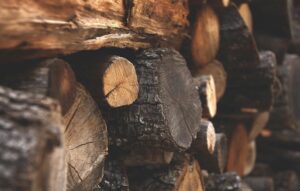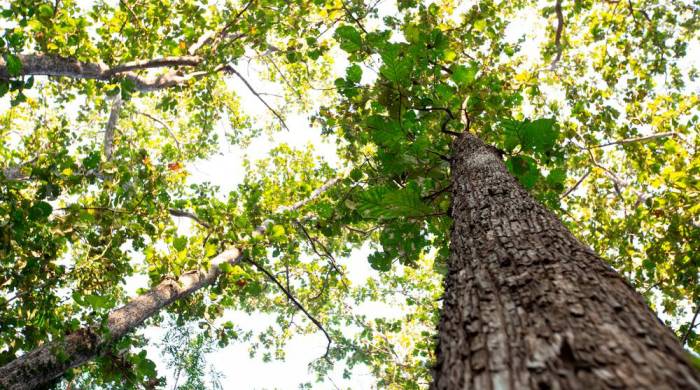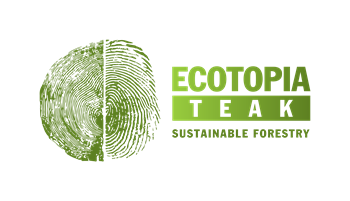
Apex: Annual teak exports in Panama reach $30 million.
Lourdes García Armuelles

In the country, there are 80,000 hectares of commercial teak plantations. Most of these are located in East Panama, Darién, and Chiriquí. Teak accounts for 98% of the timber exported from Panama.
Annually, teak exports in Panama reach a value of $30 million, with seven to ten thousand 40-foot containers placed on the market, confirmed Bianca Morán, president of the Panamanian Exporters Association (Apex).
According to Morán, as of 2024, exports in this sector have already reached $16 million.
“In Panama, 98% of the timber exported is teak, a species that is not native to the country because all the teak that exists was planted,” said the Apex president at a press meeting on Tuesday.
In the first four months of 2024, Panamanian exports amounted to $283.3 million. Of this value, the export of raw teak represented 6.1%, according to data from the Ministry of Commerce and Industries.
In the country, there are 80,000 hectares of commercial teak plantations. Most are located in East Panama, Darién, and Chiriquí.
Although teak export is one of the largest sectors in the country, the Apex president clarified that it also experiences fluctuations, depending on market demand. “Teak is a commodity, just like copper and gold, so it depends on market demand. For example, this year in Europe, there is an economic recession. However, during COVID-19, we sold a lot because people were at home and wanted new furniture,” commented Morán.
“We need to move forward to not rely on a single market. In this case, what has affected us is that India has a quantity of timber that it can definitely consume annually. We are focused on wanting to sell everything to India, but there are other countries that also produce timber, so we need to take advantage of the tools the market offers us,” she added.
For the Apex president, another disadvantage is that among all the major companies dedicated to exporting teak in the country, only three do so directly, and the rest through intermediaries.
“In teak and all sectors, when you use an intermediary, it means that a portion is taken that should stay with the producer. This is what we need to expand: our direct export base,” she emphasized.
Teak is a type of timber mainly used to create outdoor furniture. Its high presence in Panama has made the country one of the largest certified producers in the region.
To continue leveraging these advantages, the Apex president called for promoting the arrival of more certified forest investors.
“They voluntarily meet much higher standards than what Panama requires as a country, and that is what generates people living from the forest with dignity, with a model forest,” confirmed Morán.
Wood and Control
Álvaro Castillo, from the Natural Heritage section of the Forestry Directorate at the Ministry of Environment (MiAmbiente), emphasized that in the forest, there is a variety of timber species. However, those that are most popular for export are hardwoods, such as balsam, almond, bitter almond, quira, and teak.
For the national market, species such as espavé, cedar, oak, zorro, and amarillo dominate, known for their good sales and ease of use in making doors, floors, and other products.
Castillo acknowledged that over the years, some companies have shown interest in selling round timber or timber with some degree of processing.
To prevent illegality, he revealed that since 2018, MiAmbiente has established a digital forest traceability system with two components. The first is the use of a chip to digitize all the information of the tree, including data such as location, thickness, height, and species.
Additionally, they use a tag, which is a QR code linked to the chip, to track traceability from the moment the timber is cut until it reaches the industry.
According to the official, these measures have led to fewer seizures of illegal timber. For example, he explained that in recent years, around 200 cubic meters of timber have been reported as retained due to illegality, whereas previously, these figures ranged from 1,000 to 1,800 cubic meters across the country.
“We have seen the statistics, and the seizures of illegal timber are indeed fewer. Sometimes we seize 10 logs when it used to be 30 or 40,” Castillo commented.
Regarding the cocobolo tree species, he said that MiAmbiente continues to detect illegal activities, primarily due to illegal logging in national parks such as Soberanía and Camino de Cruces.
“There is very little illegal logging of cocobolo nowadays. From 2014 to 2019, 1,000 cubic meters of this timber were confiscated,” detailed the MiAmbiente official, who also indicated that in other areas, there have been impacts on cedar, balsam, espavé, quira, and oak.
Castillo highlighted that today, illegal timber is not reaching commercial markets because, due to operations conducted with public security entities, this material is being detected in transit.
ÁLVARO CASTILLO, MINISTRY OF ENVIRONMENT “We have seen the statistics, and the seizures of illegal timber are indeed fewer. Sometimes we seize 10 logs when it used to be 30 or 40,”
BIANCA MORÁN, PRESIDENT OF APEX “In Panama, 98% of the timber exported is teak, a species that is not native to the country because all the teak that exists was planted,”

About us
Ecotopia Teak, S.A., we are a family-owned company dedicated to reforestation, harvesting, and exporting wood from commercial plantations. We work under high production standards and with social responsibility to obtain high-quality wood according to the needs and demands of national and international markets. Additionally, we actively contribute to the local economy by creating employment opportunities in the communities where we operate. Our commitment is to lead the industry in sustainable reforestation and wood production, preserving our natural resources and building a greener and more sustainable future.


